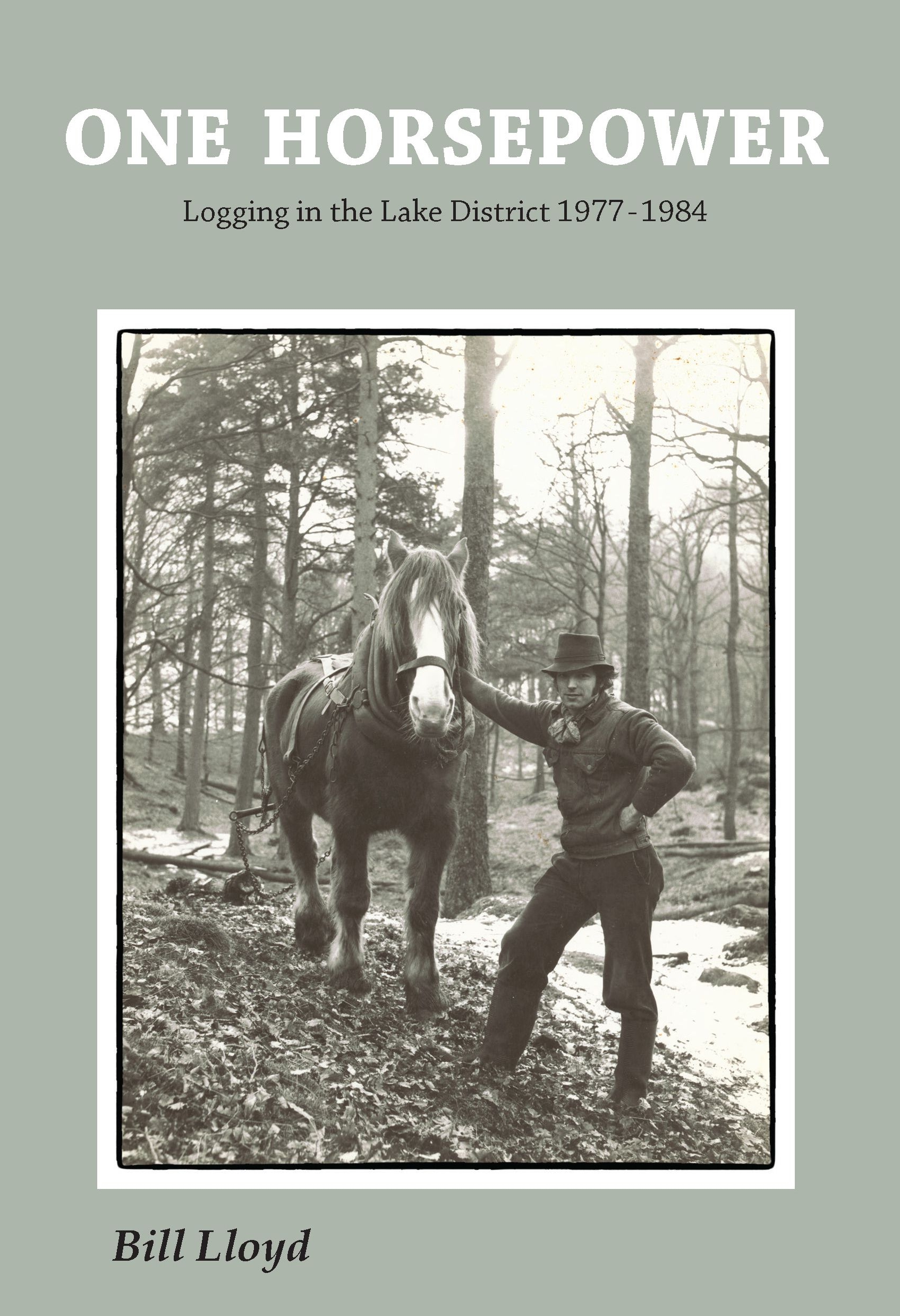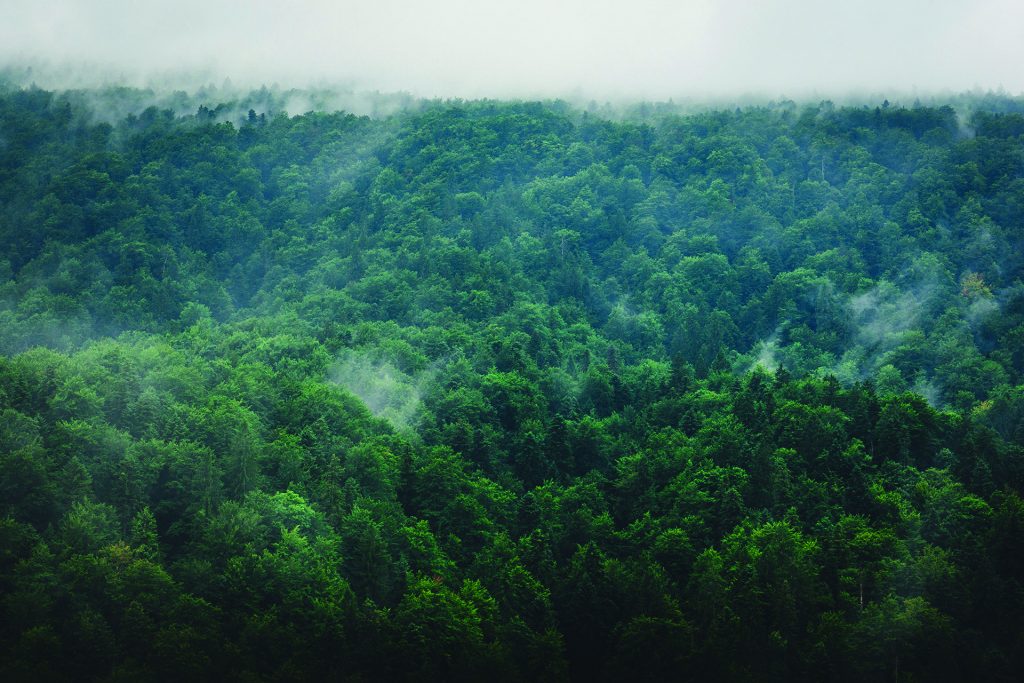
A beginner’s guide to logging with horses.
Part technical manual, part environmentalist manifesto, part spiritual quest, this book traces Bill Lloyd’s path from the insulated comforts of a salaried position as an arts administrator into the world of forestry contracting using renewable energy.
Extract from Chapter 7: St Croix Wood – an Awakening
It is difficult to explain to anyone who has not tried it why jams and snags happen so often. The forces, tensions and pressures at work when a horse drags a load of poles out of a wood over difficult terrain can be complex and unpredictable. Most of the film of horse extraction does not show the inevitable jams and snags, but a critical part of the horseman’s skill is to avoid them or else to overcome them. Horse extraction is as much an art as a science and it was pride in the art, the craft skill, that made the job so satisfying. The obvious snags like high stocks, sharp bends and low branches can be identified, and the horseman can learn to judge whether a pole is too long to get round a curve or too wide to get through a gap. Man and horse must also develop an ‘eye,’ an instinctive quick judgement, part logic and part intuition, about where, in four-dimensional space-time, the two ends of a pole will be at any given moment. This ‘eye’, this intuitive feel for how the load will behave, makes a difference when pay day comes – and a good eye can keep the horseman out of hospital. Sure, a tractor man needs good judgement, and for all the same reasons, but many of the subtle judgements can be made irrelevant by some extra hydraulics, a bigger tractor, and longer winch ropes. Learning the subtle techniques of the horseman while working up-close with the living, breathing forces of nature, rather than battering them into submission with a machine, brought me the beginnings of a new understanding and a new way of looking at the world.
On my first job at St. Croix, I experienced something of the mythic nature of logging with horses, something subjective, possibly romantic and idealized, but grounded in the material world. Ideologically I aspired to be a part of a natural, self-sustaining ecological cycle, and I became fascinated by the relationship between the ideology, the craft and the science; between philosophy, intuition and logic, and with the basic physics at the heart of it all. Horse logging also became a political matter, concerning the ownership of the land and the trees, the relationships between the owner and the contractor, between capital and labour, and the nature of the power needed to harvest a crop of timber.
At St. Croix I began to see the woodland not as a commodity or a production line but as an ‘otherworld’, another plane, like another planet where I had to learn new rules and new ways of being. Working in the wood convinced me of the impossibility of ‘owning’ natural processes, and made me realise that ‘ownership’ is a legal fiction – accepted as true but in reality impossible. I developed a sub-conscious understanding about the relationship between living matter (in the form of timber), energy (in the form of horse traction and sunlight) and space (in the form of the woodland). I could not express it as a mathematical formula, my language was inadequate to describe it exactly, but I recognised the inability of human consciousness to grasp the infinite complexity of the natural world. I discovered that some of the essential facts of life – the nature of growth and the miracle of the harvest – lie beyond the reach of words, accountancy and economics, in a different, miraculous, dimension.
After the Ice Ages, before any trees appeared, the space above the ground at St. Croix had been just that – empty space. Trees seeded themselves or were planted, trees grew, time passed, and the empty space became solid matter in the form of 80 cubic metres per hectare of heavy timber. The highly evolved and sophisticated chlorophyll molecule used the photon energy of sunlight to provide food for self-replicating cells of DNA by making oxygen and glucose from carbon dioxide and water.

Photo-synthesis: The humble leaf , which converts CO2 and water into timber and oxygen, using the energy of sunlight.
That seemed to me like some kind of miracle for a start. I was employed to harvest that miraculous stuff, pull it out of the chaotic wildness, where it had grown by a process beyond my comprehension. I converted it into a saleable product, stacked by the roadside to wait for a lorry to take it to a factory, where it would be processed into newsprint or chipboard, or maybe roof beams or toilet paper. The woodland became empty space again, the living mass was harvested and moved, one space was created and another space was filled. Even after the trees had been hauled out of the wood, the logs retained their miraculous, otherworldly character in my mind – a miracle of photosynthesis and evolution as much as a valuable commodity feedstock for our industrial systems.
That insight into the natural world gave my work and my life a meaning beyond mere ‘production’. The insight revealed part of what is really happening when we harvest the generous nature of woodland, and how sustainable harvesting practice is linked to the intuitive and instinctive relationships we have with the land. The ‘ownership’ of land gives legitimacy to the ownership of the harvest and the value of my stacks of timber could be easily stated as numbers – as cubic metres or tons or products or money in the bank, but the ‘meaning’ of the timber, its true and original nature, the essential reality of the log, was not made up of numbers, or products, or money values, or even of any words, except perhaps ‘miraculous logness’. Words and numbers are mere symbols and the word ‘log’ is of course a word, not a log. The whole forest is ‘other’ – part of another realm beyond language and which for millennia has been understood in folklore and religion as a place of adventure, romance, danger, sanctuary and enchantment. A log dragged out by a tractor becomes a commodity – plain industrial feedstock – as soon as it reaches the roadside. A log dragged out by a man and a horse – flesh and blood and bone – can remain a miracle, a wonder of nature, with a special meaning, even if only for the horseman. The true value of timber production for me was the miraculous, bountiful transformation from empty space into solid matter through time – a transformation which could be repeated over and over again, by photosynthesis and the energy of the sun. When I looked at a stack of wood with this insight I did not see a ‘product’ but an awesome manifestation of the same life-force and pure energy which created the horse and the horseman, who then harvest the miraculous bounty.

Nature’s way of fixing carbon dioxide.
All the pieces of the jigsaw were manifestations of the same energy, the same natural forces reproducing themselves over millions of years of slow evolutionary change. Tree, horse and horseman are part of one family, like distant cousins, all variants of the same extraordinary life-form that is the DNA molecule, about 35 percent of which humans share with trees, and about 80 percent of which we share with horses.
Guided by the signposts from Gary Snyder and Satish Kumar, St. Croix taught me a childlike wonder at life itself, and how precious is the life, and how precious the wonder. Using horses instead of tractors allowed me to preserve that wonder, that sense of fragility, of harmony, balance, and communion. Horsepower led me to believe that if we honour and respect that life-force and those natural processes, we may not be as productive, but our lives might be given new meaning, and we might at least endure as a species. Maybe, if we have a right relationship with the land, we might preserve our self-respect as well as our planet.
The logic behind this insight was unscientific and inadequate, and the economics were naive. The resulting description may be vague, sentimental and subjective, even romanticized, but I am not embarrassed or ashamed of my limited ability to express these thoughts, and the lack of empirical evidence and literary precision doesn’t bother me at all now. My difficulty in expressing these ideas increased my respect for the great poets, who journey into this ‘otherworld’ of wonder and return, like pearl fishermen, with poems to prove that they have been there. My literary aspirations sprang from my association with the poets at the Arvon Foundation, but these insights arose from practical experience, in which the techniques of horse logging became a form of meditation or spiritual practice, accessible only while I was working in the wood. The insights would come to mind without any resolution or conclusion, while hauling logs, or contemplating a tree, or a landscape, or grooming a horse, or drinking tea from a tin mug, steaming in the cold air.
I knew that the discovery had changed me forever. I became more aware of my own literary and philosophical limitations, but to compensate I realised that meaning does not always require words. We can find meaning, harmony and satisfaction at a sub-conscious level, which we cannot always explain. My mission had taken me to another country, inaccessible to logic, in which the accountant’s bottom line, the internal combustion engine and economic theory had no place and could probably never have a place. If I wanted to explore this harmonious but fragile world, I would have to tread lightly.
I also had to make a living, so had to use a chainsaw and a van and I had to keep my accounts up to date and show a profit, so of course my ideal world was a compromise with reality. I soon became aware of harsh economics, of the place of the labourer and his real relationship to the boss and the dependence of both boss and labourer on the accumulation of capital. My awareness of the political relationship between labour and capital did not make me any more or any less of a socialist, although I concluded that I was now, for better or for worse, probably a capitalist. I owned the means of production, which was the classic Marxist definition. I had borrowed money to buy the horse and the chainsaw and was now hiring them out with my labour, so I was trying to make a return on my investment as well as a living wage. Soon I was even buying and selling timber, so was exploiting the woodland for private gain. I accepted that made me a capitalist, but I wondered if a capitalist must inevitably be an exploiter. Could a capitalist not be a harmonious part of the natural world to which I felt that I belonged?
In order to maintain my self-respect, I needed to show that it was possible to be a capitalist without the worst characteristics – without being selfish, greedy, destructive, rapacious and brutal. Does it matter anyway? Does anybody care? Forty years later, when the credit crisis, the fiscal crisis, the banking crisis, the Euro crisis, the Brexit crisis, the global pandemic and looming environmental catastrophe all indicate that capitalism has some major defects, it seems to matter more than ever.
I did not find any satisfactory answers to the problems of capitalism, then or now, but I knew as soon as I started pulling wood in St. Croix that neither my political ideology nor my spiritual home did not fit easily into any box, or with any label that I knew about. I had steered my own course against the rain and wind into unknown territory to try to change the world, but I soon began to doubt my old certainties and to retreat from ideology. My reading of Orwell and Solzhenitsyn had convinced me of the danger of totalitarian states, but I could not reconcile that with my conviction that unregulated markets and uninhibited consumerism had to be controlled. In the 40 years since I took refuge in the wood, the free market has brought enormous wealth for some, alongside devastating environmental damage. The increasing power of the state and social spending on health and welfare has lifted millions of the world’s poorest out of poverty, and raised the living standards of billions more, yet capitalism remains both voracious and fragile. With hindsight, my expectation of imminent economic collapse 40 years ago was plain wrong, but as the planetary environmental crisis intensifies, so the need for a solution to the contradictions of consumerism becomes more urgent.
Bill Lloyd

Hardback SOLD OUT, sorry.
Paperback now in stock. £18.99 plus postage
eBook available from http://billlloyd.co.uk/product-category/publications/ Price £5.00 (50Mb)
PDF available on request. (6Mb)

